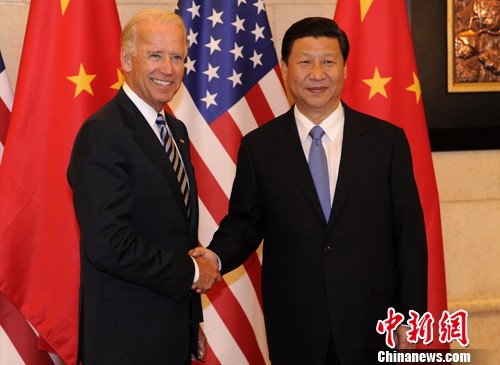Did Biden's Asian trip advance US-China relations?
- By Stephen Harner
 0 Comment(s)
0 Comment(s) Print
Print E-mail chinausfocus.com, December 12, 2013
E-mail chinausfocus.com, December 12, 2013
All in all, was the December 2-7 U.S. Vice President Biden visit to Japan, China, and South Korea a success, a failure, or a muddle?
|
|
|
U.S. Vice President Joe Biden shakes hands with Chinese President Xi Jinping inside the Great Hall of the People in Beijing. |
To answer this question readers of China-U.S. Focus will apply a specific metric: progress, or lack of progress, toward a constructive, win-win “new type of great power relationship” between China and the United States.
While in China, some of Biden’s public rhetoric was certainly encouraging. During a welcoming meeting with Vice President Li Yuanchao on December 4 Biden gushed: “This is a hugely consequential relationship that is going to effect the 21st century.” Continuing, he averred that U.S.-China relations will become the “central, sort of organizing principle in international relations for a long time.”
However, earlier, during his visit to Japan, there was scant evidence from Biden of U.S. policy or actions changing in ways reflecting an “organizing principle” of constructive engagement with China. On the contrary, by words and deeds Biden’s goal seemed to be hardening defenses against change in a status quo that is in many ways incompatible with harmonious long term U.S.-Chinese relations.
Even in Beijing, while being accorded treatment exceeding the requirements of protocol, Biden made comments evidencing the “soft imperialism” informing Obama’s policy toward Asia and particularly toward China. Visiting the consular section at the U.S. embassy, Biden effused to a long line of young Chinese waiting for a U.S. visa: "I hope you learn that innovation can only occur where you can breathe free, challenge the government, challenge religious leaders... Children in America are rewarded — not punished — for challenging the status quo."
What, we must ask, were Biden’s Beijing hosts supposed to make of such comments? Perhaps the most important principle of a “new type of great power relationship” will be mutual respect, including respect for differing political, social, and cultural systems. Biden’s remarks suggest that the United States, brimming with self-conceit, is unwilling to accord China such respect.
Before Biden touched down in Tokyo on December 2, China’s establishment of air defense identification zone (ADIZ) had the effect of focusing attention on probably the most problematic obstacles--from the Chinese side--to a constructive relationship. These are the U.S.-Japan military alliance, the U.S.-South Korea military alliance, and the “pivot” or “rebalance” to Asia.






